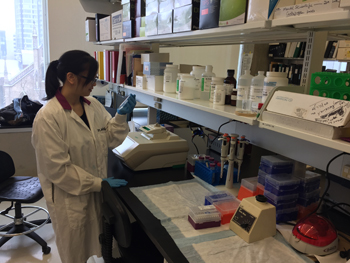‘In basic science, you have huge potential’: Meet Dr. Cynthia Luk

By Ana Gajic

Dr. Cynthia Luk
Dr. Cynthia Luk is a scientist at the Keenan Research Centre for Biomedical Science (KRCBS), and an endocrinologist at St. Michael’s Hospital. She is one of the newest scientists at the KRCBS, and we sat down with her to learn more about her work and her passion for basic science research.
Tell us about your research.
I study obesity, diabetes and associated conditions. In particular I study signalling pathways in fat and how they can potentially contribute to obesity and diabetes, and how we can target these pathways to advance treatment. Signalling pathways are how cells communicate and control cell activity and action.
I am especially interested in pathways that are involved in cell survival and death. I’m looking at how these processes can affect how we gain weight or how we regulate blood sugars in diabetes.
What are some of the ongoing projects in your lab?
I’m starting to research fibrosis – scarring of connective tissue – in fat. There’s increasing data to suggest that fibrosis in fat is important for regulating blood sugars and it might increase as we gain weight. We don’t yet know how this is regulated.
I’m also studying caspase-8 – a molecule that plays an important role in cell death – and how it might affect energy use and heat production in different types of fat.
Another area I’m looking at is how fat interacts with other organs, for example, the liver or in the development of atherosclerosis, which is the process that leads to cardiovascular disease, such as heart attacks and strokes.
Why did you choose to work at the Keenan Research Centre for Biomedical Science?
It’s a very exciting place to be! There’s a very strong team here focusing on diabetes research.
There’s also an excellent infrastructure for clinician-scientists and a lot of support for new scientists. There are many resources we have access to – like Core Facilities. For someone like me who is new, it’s nice to be able to know that some of the large equipment that I would like to use is available for us to share and it’s a very organized process.
Did you know? Basic science fuels fundamental knowledge about the world, and at St. Michael’s, specifically about medicine. It’s what is traditionally called wet lab research. |
Everyone I’ve talked to has been very welcoming and willing to work together. There is definitely a culture that fosters great science here. Researchers in completely different areas have offered to support me in my research. A lot of the research that’s going on here is very applicable to my work – even the ongoing research that’s happening outside of the diabetes sphere. I feel like I can fit into it.
What do you want people to know about basic science research at St. Michael’s?
Basic science is a big component of what happens here and I want us all to feel like we’re part of it. At St. Michael’s in particular, we have our bridge that connects the research building to the hospital and it really is a metaphor for how the two sides relate to each other.
All the work that I do in the hospital, like seeing patients, helps to inform and enhance my research questions. Then I can come to the lab and address those questions. And sometimes our findings in the lab shape how I interact with or treat patients. The hospital and the research enterprise are synergistic and they truly support one another’s progress.
There are incredible possibilities in basic science, sometimes it’s just a longer timeline that you’re looking at and a different type of science that you learn. We are very lucky to be in Toronto where there is a history of translational medicine, and where basic science has made a real impact. From the discovery of insulin and newer diabetes medications to showing an important role for diet and blood sugar management, Toronto is an exciting focus of many types of diabetes and scientific research. Particularly in basic science, you have huge potential for creativity to discover something new or change the way we think about something.
About St. Michael’s Hospital
St. Michael’s Hospital provides compassionate care to all who enter its doors. The hospital also provides outstanding medical education to future health care professionals in more than 29 academic disciplines. Critical care and trauma, heart disease, neurosurgery, diabetes, cancer care, care of the homeless and global health are among the Hospital’s recognized areas of expertise. Through the Keenan Research Centre and the Li Ka Shing International Healthcare Education Centre, which make up the Li Ka Shing Knowledge Institute, research and education at St. Michael’s Hospital are recognized and make an impact around the world. Founded in 1892, the hospital is fully affiliated with the University of Toronto.
St. Michael’s Hospital with Providence Healthcare and St. Joseph’s Health Centre now operate under one corporate entity as of August 1, 2017. United, the three organizations serve patients, residents and clients across the full spectrum of care, spanning primary care, secondary community care, tertiary and quaternary care services to post-acute through rehabilitation, palliative care and long-term care, while investing in world-class research and education.
